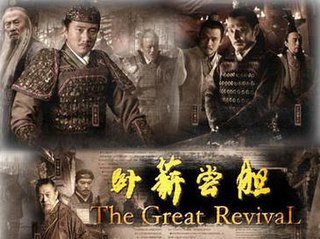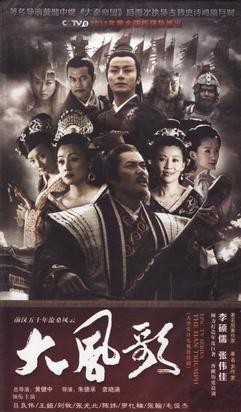
Zhao was one of the seven major states during the Warring States period of ancient China. It emerged from the tripartite division of Jin, along with Han and Wei, in the 5th century BC. Zhao gained considerable strength from the military reforms initiated during the reign of King Wuling, but suffered a crushing defeat at the hands of Qin at the Battle of Changping. Its territory included areas in the modern provinces of Inner Mongolia, Hebei, Shanxi and Shaanxi. It bordered the states of Qin, Wei, and Yan, as well as various nomadic peoples including the Hu and Xiongnu. Its capital was Handan, in modern Hebei province.

Emperor Wen of Han, born Liu Heng, was the fifth emperor of the Western Han dynasty in China from 180 to his death in 157 BCE. The son of Emperor Gao and Consort Bo, his reign provided a much needed stability within the ruling Liu clan after the unstable and violent regency of Empress Lü, who went after numerous members of the clan. The prosperous reigns of Wen and his son Emperor Jing are highly regarded by historians, being referred to as the Rule of Wen and Jing.

The Chu–Han Contention (楚漢相爭), also known as the Chu–Han War (楚漢戰爭), was an interregnum period in ancient China between the fall of the Qin dynasty and the establishment of the Han dynasty. After the third and last Qin ruler, Ziying, unconditionally surrendered to rebel forces in 206 BCE, the former Qin Empire was divided by rebel leader Xiang Yu into the Eighteen Kingdoms, which were ruled by various rebel leaders and surrendered Qin generals. A civil war soon broke out, most prominently between two major contending powers – Xiang Yu's Western Chu and Liu Bang's Han. Some of the other kingdoms also waged war among themselves but these were largely insignificant compared to the main conflict between Chu and Han. The war ended in 202 BCE with a Han victory at the Battle of Gaixia, during which Xiang Yu committed suicide after making a last stand. Liu Bang subsequently proclaimed himself emperor and established the Han dynasty as the ruling dynasty of China.
Zhang Han was a Chinese military general of the Qin dynasty. When uprisings erupted throughout China during the reign of Qin Er Shi, Zhang Han led the Qin armies and successfully quelled several of these rebel forces. In 207 BC, Zhang Han was defeated by Xiang Yu of Chu at the Battle of Julu, after which he surrendered along with his 200,000 troops. He was conferred the title "King of Yong" (雍王) by Xiang Yu and given part of the lands in Guanzhong as his fief when Xiang split the former Qin Empire into the Eighteen Kingdoms after the fall of the Qin dynasty. Zhang Han's territory was conquered by Liu Bang in 206 BC, and he committed suicide a year later.

Chu, or Ch'u in Wade–Giles romanization, was a Zhou dynasty vassal state. Their first ruler was King Wu of Chu in the early 8th century BCE. Chu was located in the south of the Zhou heartland and lasted during the Spring and Autumn period. At the end of the Warring States period it was destroyed by the Qin in 223 BCE during the Qin's wars of unification.

Prince or King of Dai was an ancient and medieval Chinese title.
Emperor Yi of Chu, also known as King Huai II of Chu before receiving his de jure emperor title, personal name Xiong Xin, was the ruler of the revived Chu state in the late Qin dynasty. He was a grandson of King Huai of Chu. In 223 BC, during the Warring States period, the Chu state was conquered by the Qin state, which unified the various Chinese feudal states in a series of wars and established the Qin dynasty in 221 BC. In 209 BC, when rebellions broke out throughout China to overthrow the Qin dynasty, the Chu state was revived as an insurgent state against Qin imperial rule. Xiong Xin was discovered by Xiang Liang, a rebel leader who descended from a famous Chu general, Xiang Yan, and installed on the Chu throne as "King Huai II of Chu". However, Xiong Xin was merely a puppet ruler because power was concentrated in Xiang Liang's hands, and was later passed on to Xiang Liang's nephew, Xiang Yu, after Xiang Liang was killed in battle. In 206 BC, the Qin dynasty was overthrown by the rebels, after which Xiang Yu, who was the de facto leader of all the rebel forces, divided the former Qin Empire into the Eighteen Kingdoms. He promoted King Huai II to a more "honourable" title – Emperor Yi of Chu – and made him the nominal sovereign ruler over all the Eighteen Kingdoms. Xiang Yu then had Emperor Yi relocated to Chen County and secretly ordered Ying Bu to assassinate the emperor during the journey.
The Grand Chancellor, also translated as counselor-in-chief, chancellor, chief councillor, chief minister, imperial chancellor, lieutenant chancellor and prime minister, was the highest-ranking executive official in the imperial Chinese government. The term was known by many different names throughout Chinese history, and the exact extent of the powers associated with the position fluctuated greatly, even during a particular dynasty. During the Six Dynasties period, the term denoted a number of power-holders serving as chief administrators, including zhongshun jian, zhongshu ling, shizhong, shangshu ling and puye.
The Battle of Jingxing (井陘之戰), also known as the Battle of Tao River (洮水之戰), was fought in October 205 BC between the army of Han, commanded by Han Xin, and a Zhao army. The Zhao were led by Prince Zhao Xie (趙歇) of Zhao and Chen Yu (陳餘), also known as the Lord of Cheng An (成安君), who was serving as Zhao Xie's prime minister.

The Emperor in Han Dynasty, also released under the title The Emperor Han Wu in some countries, is a 2005 Chinese historical drama television series based on the life of Emperor Wu of the Han dynasty. It uses the historical texts Records of the Grand Historian and Book of Han as its source material.

Three Kingdoms is a 2010 Chinese television series based on the events in the late Eastern Han dynasty and the Three Kingdoms period. The plot is adapted from the 14th century historical novel Romance of the Three Kingdoms and other stories about the Three Kingdoms period. Directed by Gao Xixi, the series had a budget of over 160 million RMB and took five years of pre-production work. Shooting of the series commenced in October 2008, and it was released in China in May 2010.

The Great Revival, also known as Wo Xin Chang Dan, is a Chinese television series based on the conflict between the Yue and Wu states in the Spring and Autumn period. The Chinese title of the series is a Chinese idiom derived from King Goujian of Yue's perseverance in overcoming the odds to revive his fallen state of Yue and conquer the rival state of Wu. The series was first broadcast on CCTV-8 in mainland China in January 2007.

The Water Margin is a 1998 Chinese television series adapted from Shi Nai'an's classical 14th-century novel of the same title. It was produced by CCTV with Zhang Jizhong as producer. It was first broadcast in China in January 1998. The series also featured action choreography by Yuen Woo-ping.

Dai was a state which existed in northern Hebei during the Spring and Autumn Period of Chinese history. Its eponymous capital was located north of the Zhou Kingdom in what is now Yu County. It was apparently established by the people known to the ancient Chinese as the Baidi or "White Barbarians". They traded livestock and other goods between Central Asia and the Zhou states prior to their conquest by the Zhao clan of Jin.

The Han Triumph, also known as Wind Ode, is a Chinese television series based on historical events in the early Han dynasty, beginning with the founding of the dynasty by Liu Bang after his triumph over Xiang Yu, and the events leading to the reign of Liu Heng. Directed by Huang Jianzhong, the series starred Ray Lui, Wang Ji, Liu Mu, Zhang Guangbei, Chen Wei and Li Qingxiang in the leading roles. It was first broadcast on CCTV-8 in China on 17 December 2011.

The Qin Empire III is a 2017 Chinese television series based on Sun Haohui's novel of the same Chinese title, which romanticizes the events in China during the Warring States period primarily from the perspective of the Qin state under King Zhaoxiang. It was first aired on CCTV-1 in mainland China in 2017. It was preceded by The Qin Empire (2009) and The Qin Empire II: Alliance (2012) and followed by The Qin Empire IV (2019), which were also based on Sun Haohui's novels.

Dai Commandery was a commandery (jùn) of the state of Zhao established c. 300 BC and of northern imperial Chinese dynasties until the time of the Emperor Wen of the Sui dynasty. It occupied lands in what is now Hebei, Shanxi, and Inner Mongolia. Its seat was usually at Dai or Daixian, although it was moved to Gaoliu during the Eastern Han.
Chen Xi was a Chinese rebel leader against the first Han emperor Liu Bang.













